- Home
- Nevil Shute
Trustee From the Toolroom
Trustee From the Toolroom Read online
Contents
Cover
Title Page
Chapter One
Chapter Two
Chapter Three
Chapter Four
Chapter Five
Chapter Six
Chapter Seven
Chapter Eight
Chapter Nine
Chapter Ten
Chapter Eleven
Copyright
Chapter One
West Ealing is a suburb to the west of London, and Keith Stewart lives there in the lower part of No. 56 Somerset Road. No. 56 is an unusual house and a peculiarly ugly one, a detached house standing in a row but in a fairly spacious garden, four storeys high if you include the basement, a tall, thin slip of a house. It was built in the spacious days of 1880 when West Ealing stood on the edge of the country farmlands and was a place to which Indian Civilians retired after their years of service, but it was built of a particularly ugly yellow brick, now toned to a drab grey, at a period when English suburban architecture was going through a bad patch. The years have not dealt kindly with West Ealing; the farms are now far away. Most of the big old houses have been split up into two or three flats, as Keith Stewart had converted No. 56.
He had bought it when he married Katie in the middle of the Second War. That was soon after he moved down from Glasgow to the London area to work as a toolroom fitter with Stone and Collinson Ltd, who made sub-contract parts for aeroplanes at Perivale. It was, of course, the first house that Katie or Keith had ever owned, and they were very proud of it. They contemplated quite a family, so that they would need quite a house, the upper rooms for nurseries and children’s rooms and playrooms while the garden would be a nice place for the pram. When, after a few years, it became evident that that was not to be, they had separated the two top floors from the remainder of the house and let them off as what the agents called a maisonnette, retaining the ground floor and the basement for themselves. On the ground floor they had a bedroom in the front, the living-room and kitchen at the rear overlooking the garden, and a bathroom at the side. In the basement they had adapted what had once been the scullery as a small spare bedroom; the whole of the rest had been taken by Keith as his own domain.
Here he made models, and here he wrote about them weekly for the Miniature Mechanic, a magazine with a considerable circulation in the lower ranks of industry and with a growing popularity amongst eccentric doctors, stock-brokers, and bank managers who just liked engineering but didn’t know much about it. All his life he had made models, little steam engines, little petrol engines, little speed-boats, little locomotives, little diesels. He was a considerable horologist; in his time he had made many clocks with motions of antiquarian interest and had written full directions for constructing them, always in the Miniature Mechanic. He had made little beam engines which would have delighted James Watt and still delighted those who are fascinated by such things; he had made little jet engines which would have delighted Frank Whittle. He had made pumps and boilers and carillons that played a tune, all in the miniature scale. He was a quick worker and a ready writer upon technical matters and he delighted in making little things that worked. He had now so ordered his life that he need do nothing else.
All through the war he had written about his hobby after the long hours of overtime in the toolroom. The coming of peace had given him more leisure for his models and his articles about them, and two years later he had taken the great plunge of giving up his job in favour of his avocation. It had not benefited him financially. He would have made more money in the toolroom progressing up from charge-hand to foreman; he would have made more money as an instructor in a technical college. He would not have made more happiness than he had now attained.
He was a very serious and well-informed student of engineering matters, though he would have been amazed to hear himself described in such terms. He read about techniques for pleasure. One morning each week he would spend in the Ealing Public Library browsing through the technical magazines, slightly oppressed by a sense of guilt that he was not working. On Fridays he always went to London to deliver his weekly ‘copy’ to the editor of the Miniature Mechanic and arrange about the blocks, and being in London, he would take time off and sneak away for three or four hours to the library of the Patent Office for a period of interest and pleasure before going home to catch up with his work. He worked normally till eleven or twelve each night.
He called the front basement room his clean workshop, and this was his machine shop. Here he had a six-inch Herbert lathe for heavy work, a three-and-a-half-inch Myford, and a Boley watchmaker’s lathe. He had a Senior milling machine and a Roxford shaper, a large and a small drill press, and a vast array of tools ready to hand. A long bench ran across the window, a tubular light system ran across the ceiling, and a small camera and flashgun stood ready for use in a cupboard, for it was his habit to take photographs of interesting processes to illustrate his articles.
The other room, which once had been the kitchen of the house, was considerably larger. He called this his dirty workshop, but it was in this room that he had his desk and the drawing board, for it was usually free of oil. Here he did what small amount of carpentry and woodworking might be necessary for his models. Here he welded and brazed, here he tempered and hardened steel, here he did steam trials of his steam engines, so that it had been necessary for him to fit an extractor fan into the window. It was in this room that he stood talking to his brother-in-law, Commander Dermott, the red leather jewel case in his hands.
The copper box that he had made stood on the bench before them, the rectangular sheet of copper that was to be the lid loose beside it. ‘I’ve left room for packing this asbestos card all round it,’ Keith said. ‘I’ll braze it up with a small oxy-acetylene flame, but I’m afraid it’s going to get a bit hot inside. I’m afraid it may scorch the leather, even with the asbestos.’
‘I don’t think that matters,’ said the naval officer. ‘It won’t set it on fire?’
Keith shook his head. ‘The top is a good fit, and I’ll clamp it down all round while I’m brazing. There won’t be enough oxygen inside to support combustion. I’m just worried about the look of it when you take it out. It could be a bit brown.’
‘That doesn’t matter.’
Keith shook the case; it was fairly heavy, but nothing rattled. He glanced at his brother-in-law. ‘What’s it got in it?’
‘All Jo’s jewels,’ John Dermott told him. ‘You’re only allowed to take so much out of the country.’
‘This is going somewhere in the yacht?’
The other nodded. ‘Somewhere where nobody’s going to find it.’
Keith said no more but took off his jacket and hung it on a hook at the back of the door. He put on a leather apron that covered his body from the neck down, and turned on the gas at the cylinders, picked up the torch, and went to work. He never questioned anything that his brother-in-law said or did; they came from different worlds. John had been a regular naval officer, and Keith was a modest little man.
His sister had done a good job for herself, he reflected as he brazed the seam, when she married John Dermott; it had turned out well in spite of the social disparity. Jo had been a pretty child with good Scots sense; she had been fond of dancing and at the age of twelve she had become one of the Tiller Girls. Her first part was one of nine Elves in the Magic Wood, in pantomime. She had stayed with the organisation and had played in theatres and music halls all over the British Isles, with occasional runs in London. It had been partly upon her account that Keith had left Glasgow and come down to work in the south, to see more of his only sister. It had gone on till at the age of nineteen she had been in the Christmas pantomime at Portsmouth. She was playing a smal
l speaking part by that time as the Widow Twankey’s maid, more noticeable than in the chorus. She had gone with a party of show girls and young naval officers to the Queen’s Hotel after the performance; she told Lieutenant Dermott that she was going to see the Victory next day. He took her there in pouring rain, which neither of them noticed. He followed her to London. Six weeks later, in the Palm House at Kew Gardens, he asked her to marry him, and she accepted. It wasn’t till nearly a month afterwards that she learned that she was marrying the nephew of Lord Dungannon.
Inevitably she had drifted somewhat apart from her brother Keith, the toolroom fitter in the factory at Perivale. She had the makings of a good actress in her; she was observant and could project herself into a part. It was no effort to her to take up the part of a young naval officer’s wife, abandoning her Renfrew antecedents; with the Tiller Girls she had learned to abandon or assume her Scots accent at will. She married Lieutenant Dermott in 1939 and almost immediately the war came, taking him away from her for the best part of five years. In those years she saw him only for brief spells of leave. They did not start a family during the war. She lived in a small flat over a shop at Cosham and worked as a woodworker with many other girls in a small dispersal aircraft factory at Havant. In the evenings she attempted to catch up on education to be on equal terms with other naval wives. She attended classes at the Polytechnic in French and History and Geography and English Literature; the latter she found infinitely tedious, but struggled on with it.
John Dermott came back to her in 1946, a lieutenant-commander with greying hair and a face lined on the Murmansk convoy route; in 1947 their only child, Janice, was born. They bought a little house in Southsea and lived modestly, as naval officers do. They could have lived better, for John Dermott had a private income of about a thousand a year, but already the shadow of an early retirement from the Navy lay upon him. He was a general duties officer, a salt horse, impatient with the rush of new techniques that were invading his service. Early retirement lay ahead of him as he passed out of the promotion zone. They saved their money but for the extravagance of two years in Hong Kong for Joanna and the baby Janice when he was drafted to the China Station, and for the mild extravagance of duty-free gin in increasing quantities as John Dermott passed out of the zone. Early in 1957 the axe fell and John Dermott was retired from the service to which he had given his life; he was then forty-five, the same age as his brother-in-law, Keith.
Joanna sat talking to Katie while the two men worked in the basement room below. ‘It’s terribly kind of you to offer to look after Janice,’ she said. ‘I do want you to know how we feel about that.’ She paused. ‘I wouldn’t feel very comfortable about leaving her for all that time with the Dungannons.’
Katie said anxiously, ‘I do hope she’ll be happy, though. Ealing isn’t very exciting, not after what she’s been used to. Do you think she will? I mean, never having had any myself, one doesn’t know …’
She was a plump little woman in her early forties; she worked in the Household Linen department of Buckley’s drapery shop, in Ealing Broadway. She had been in Household Linen as a girl, but in the war she had been directed to running an automatic lathe at Stone and Collinson, at Perivale. Here she had met Keith Stewart in 1941; they had married in 1942 and she had gone back to her automatic lathe after a week’s honeymoon. They had no children. The purchase and conversion of the house had taken all their savings and left them with a heavy mortgage. She had tried it for a year after the war as a lady of leisure and had tired of it; when Keith gave up his job and took up free-lance writing and construction for the Miniature Mechanic Katie went back gladly to the Household Linen, a red-faced, dumpy little woman, well liked by the customers.
Joanna said, ‘I think she’ll be very happy with you, very happy indeed. I wouldn’t leave her if I thought she wouldn’t. I think you’ll spoil her, though.’
‘She’s such a dear little thing,’ said Katie. “I was saying to Keith, perhaps we ought to have a kitten.”
‘You’ll be landed with a cat for the rest of your lives,’ Joanna said practically. ‘She’ll only be with you for about six months. I don’t think it will be longer. Then you’ll just have to take her to London Airport and put her on the aeroplane to us in Vancouver.’
‘Would that be somewhere in America?’
‘In Canada,’ Jo said. ‘It’s on the other side, on the Pacific coast. Everybody says it’s a lovely place to live in, and John thinks he can get a job there. It’s got quite a mild climate, but it rains a lot.’
‘My …’ The thought of the aeroplane was troubling to Katie. ‘I don’t like the thought of her going all that way, all alone. Would she have to change, like at a station?’
Jo shook her head. ‘She goes right through in the same aeroplane, over the North Pole.’
‘Fancy …’ Katie said. ‘Is that the way you’re going, in the yacht? All in among the ice?’
Jo shook her head. ‘You couldn’t go that way in a boat.’ Katie was a dear and she was going to look after Janice for them while they travelled, but she had lived in Ealing all her life. ‘We’re going to go southwards into the warm seas,’ she explained. ‘When we leave Hamble on Thursday week we go to Falmouth to clear Customs and to pick up anything that we’ve forgotten. Then John wants to make a passage straight for Las Palmas in the Canary Islands. From there to Barbados, and then to the Panama Canal. When we get into the Pacific, first of all we go to the Galapagos Islands, and then to Tahiti. We do want to see that, and it’s not much out of the way. Then we go up to Honolulu and from there to Vancouver. It ought to take about five months. A bit less, if we’re lucky with the winds.’
The string of foreign names perplexed Katie; she did not know where any of them were, except the Panama Canal. The whole venture was entirely alien to her experience; she struggled to make sense of it. ‘Will there be anyone to help you with the boat?’ she asked. ‘With the sails, and that?’
Jo shook her head. ‘We don’t need anybody,’ she said. ‘John and I can sail her by ourselves.’
Katie was perplexed. ‘But what happens at night, when you want to go to bed? I mean, do you anchor or something?’ A sudden doubt assailed her. ‘You have got beds, haven’t you?’
‘We’ve got very good beds,’ said Jo. ‘I sleep marvellously on board. No, we couldn’t anchor. It’s too deep. Sometimes we can let her sail herself while we both sleep.’ She tried to make the matter simple, but it was rather difficult. ‘She’ll do that with the wind forward of the beam, or running under the twin spinnakers. Otherwise we keep watch and watch - one up in the cockpit steering and the other one down below sleeping.’ She smiled. ‘It’s quite all right. We’re very used to it.’
‘You wouldn’t be sailing all the way, though, would you?’ Katie asked. ‘Keith was saying you could go some of the way with the motor.’
Joanna shook her head. ‘We shall sail all the way,’ she replied, ‘except perhaps just getting in and out of harbour. We have got a small motor, but we don’t use it at sea. It’s only a little one, and it’s dirty, and it makes a smell.’ She paused, and then she said, ‘John’s such a seaman.’
Presently Katie reverted to her own problems. ‘It’s just the holidays,’ she said thoughtfully. ‘School time — well, I’m back in the house by a quarter to six, always. School finishes at four so she’d be back here by a quarter past, but Keith is almost always here then, unless it’s a Friday. It’s really just the holidays.’
‘The Christmas holidays.’ Jo said. ‘We don’t sail till the first of August. I’m going to take her up to the Dungannons in Tyrone next week. I think school starts — Miss Pearson’s school, here — I think she said term starts on September the 15th. That means she’d be coming to you about the 13th, I suppose. I think you’ll have to meet her at Euston, but I’ll make sure that the Dungannons let you know.’
Katie nodded. ‘Keith would meet the train and bring her down here. He’d like doing that.’
‘I thi
nk we’ll be sending for her about February,’ said Jo. ‘We should be there by then, and if we haven’t got a house she can live on the boat with us. But anyway, I’ll be writing to you from each place. It’s just the Christmas holidays.’
Katie said ‘Of course, Keith is in the house most of the time, down in the workshop. They’re not very long the Christmas holidays.’
‘I don’t want her to be a burden on you and Keith.’
‘She won’t be that — honestly she won’t.’ Katie paused. ‘I think it would be nice to have children’s parties, and crackers, and presents, and all that.’
Joanna eyed her uncertainly, wondering how far she meant it. ‘I’m sure Margaret would have her.’
‘Do whatever you think would be best for her,’ said Katie. ‘But don’t do it for us. Keith’s always wanted to have kids about the place. I mean, with a great big garden, like we’ve got …’
In the room below Keith turned off the gas at the two cylinders, hung the torch up on its book, took the copper box to a sink in one corner of the room, and scrubbed the brazing with water and a wire brush. He dried it on a dirty towel, and examined the seam carefully, inch by inch. Then he handed it to his brother-in-law. ‘She’s tight now.’ he said briefly.
John Dermott took it from him. ‘No chance of sea water getting into it? Corrosion?’
‘Not in a hundred years.’ He paused. ‘When you want to open it, just cut the top off with a hacksaw — round here.’
The naval officer hesitated. ‘I’m going to set it in concrete,’ he said diffidently. Keith stared at him, surprised; he had thought the box was to go into the yacht. ‘Do you know how to mix it?’
‘I know how to mix concrete,’ the mechanic said. ‘You mix it different proportions, depending on what it’s for — what it’s got to hang on to. How much would you want?’
The naval officer hesitated, and then indicated the box upon the bench before them. ‘About as much as that, or a bit more.’

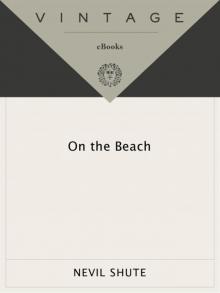 On the Beach
On the Beach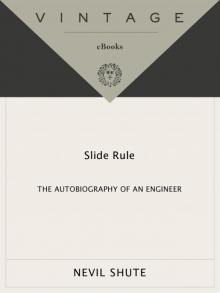 Slide Rule
Slide Rule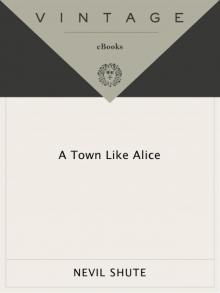 A Town Like Alice
A Town Like Alice The Far Country
The Far Country Pied Piper
Pied Piper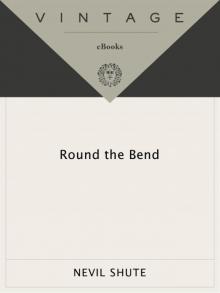 Round the Bend
Round the Bend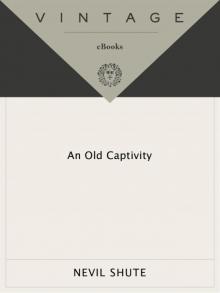 An Old Captivity
An Old Captivity Mysterious Aviator
Mysterious Aviator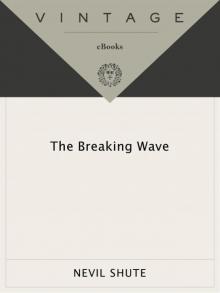 The Breaking Wave
The Breaking Wave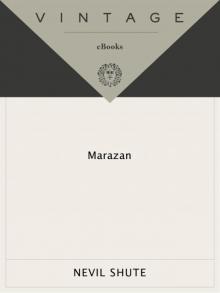 Marazan
Marazan Lonely Road
Lonely Road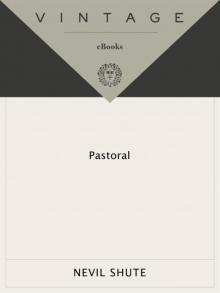 Pastoral
Pastoral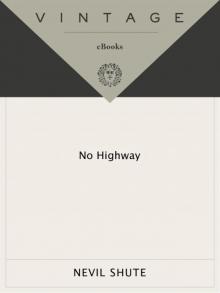 No Highway
No Highway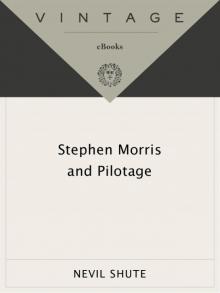 Stephen Morris and Pilotage
Stephen Morris and Pilotage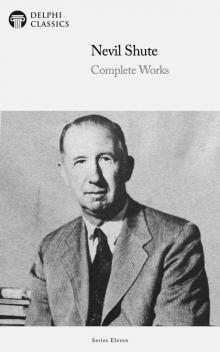 Complete Works of Nevil Shute
Complete Works of Nevil Shute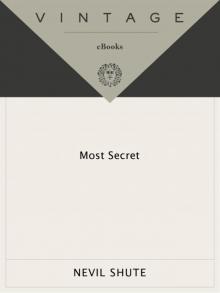 Most Secret
Most Secret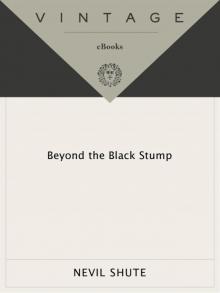 Beyond the Black Stump
Beyond the Black Stump The Rainbow and the Rose
The Rainbow and the Rose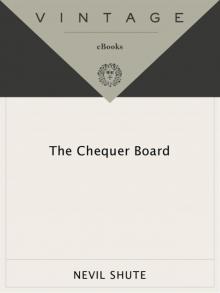 The Chequer Board
The Chequer Board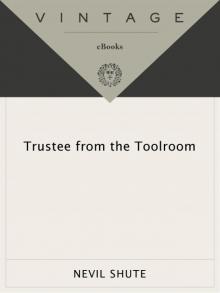 Trustee From the Toolroom
Trustee From the Toolroom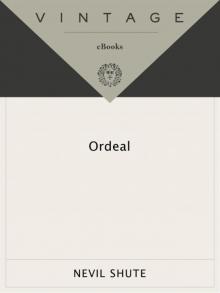 Ordeal
Ordeal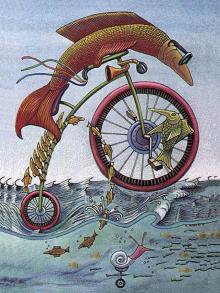 Stephen Morris
Stephen Morris